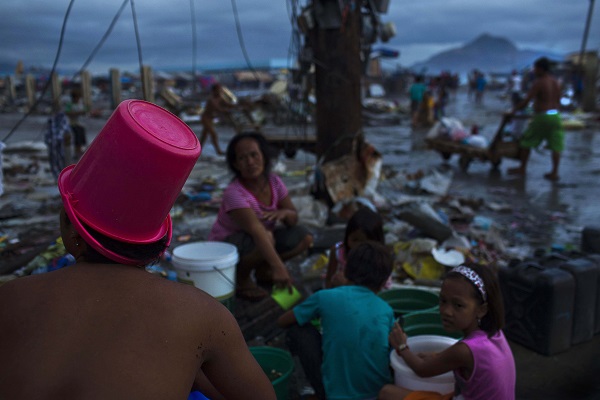
Typhoon “Yolanda” survivors collect water on a street corner among the ruins of Tacloban City Wednesday, Nov. 20, 2013. The country’s growth is expected to slow down toward the end of the year as economic activity in parts of the Visayas ground to a halt following the onslaught of Yolanda. AP PHOTO/DAVID GUTTENFELDER
MANILA, Philippines—The country’s growth is expected to slow down toward the end of the year as economic activity in parts of the Visayas ground to a halt following the onslaught of Supertyphoon “Yolanda.”
Fortunately, the country was able to build up a strong foundation in the first three quarters of the year, which would enable the government to meet its growth target for the year, according to the country’s top financial institutions.
“Gross domestic product (GDP) probably expanded by 7.3 percent in the third quarter, but could slow down to below 6 percent in the fourth quarter with the immediate effect of the typhoon on income and output,” First Metro Investments Corp. (FMIC) said in a report released Wednesday. “To be sure, reconstruction efforts could offset the loss on output and income due to the negative effects of the supertyphoon. But the affected areas reportedly represent some 12 percent of the country’s population, and the latter would probably tilt the balance.”
First Metro Investments, a unit of the country’s second-largest bank Metropolitan Bank & Trust Co., said consumer prices would also affect the Philippines’ growth prospects.
The rate of rise in consumer prices averaged at 2.8 percent from January to October. “This will certainly rise in the fourth quarter, exacerbated by the supertyphoon’s effects in the Visayas,” First Metro said in its Market Call report.
Emilio Neri Jr., Bank of the Philippine Islands’ lead economist, on Tuesday said inflation would rise despite the government’s efforts to control prices of key commodities in affected areas.
“Since government aid will be slow in addressing these supply bottlenecks, prices of goods are expected to rise in affected regions,” Neri said as he noted the severe damage to private property and infrastructure in several areas.
Earlier this week, the Bangko Sentral ng Pilipinas (BSP) released the results of its simulations that showed consumer prices rising by an average of 3.2 percent for the entire year. According to the BSP’s unofficial forecast, inflation may level off between 4 to 5 percent in November and December. Next year, inflation may accelerate to 4.5 percent, which Neri said would be “dangerously close” to the top end of the BSP’s target for the full year.
If the central bank’s unofficial forecasts proved accurate, inflation for the year would still be closer to the low end of the official 3 to 5 percent target range. Given the higher inflation forecasts, Neri said the BSP might decide to tighten its monetary policy settings earlier than expected.
Joel Noel Mendoza, senior vice president of BDO Private Bank’s wealth advisory and trust group, was more pessimistic, saying GDP growth could settle to 3 to 4 percent in the current quarter.
In a briefing on Wednesday, the BDO executive echoed the sentiments of First Metro when he cited the effects of the typhoon on productivity and income levels in the affected areas. BDO Private Bank is the private banking and wealth management subsidiary of the country’s largest lender, BDO Unibank.
The company’s growth outlook mirrors the National Economic Development Authority’s (Neda) own assessment, which showed that fourth quarter growth could slow down to 4.1 percent.
In a statement this week, Neda said the negative impact of the supertyphoon could linger through 2014 because of the reduced production capacity in affected areas. GDP growth for 2013 could be reduced by 0.3 to 0.8 of a percentage point.